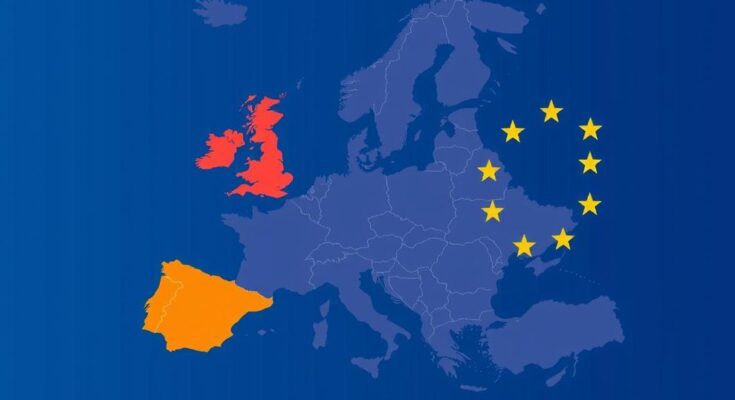The upcoming U.S. election poses critical implications for Europe as it could reshape trade relationships through potential tariffs, create business uncertainties depending on the elected candidate, and influence defense commitments amid geopolitical tensions. The outcomes of Donald Trump or Kamala Harris’s leadership will drastically alter Europe’s economic, political, and security landscape.
As the U.S. approaches election day, the stakes are particularly high for Europe, which is facing significant changes based on the potential outcome of the race between Donald Trump and Kamala Harris. The U.S. has been a critical partner for Europe, especially in trade and defense. This dependence becomes more pronounced in light of recent challenges such as economic instability, rising nationalism, and security concerns linked to Russia’s actions in Ukraine. If Donald Trump secures re-election, he intends to impose tariffs between 10% and 20% on cross-border trade, which could lead to higher costs and a possible weakening of the euro. Zach Meyers from the Centre for European Reform warns, “Tariffs will seriously dampen the EU’s economic growth.” Such measures would threaten jobs on both sides of the Atlantic and could prompt retaliatory tariffs affecting over $350 billion of U.S. exports to Europe. Conversely, if Kamala Harris were to take office, she is expected to engage in a more diplomatic dialogue with Europe, potentially pushing the EU to reassess its economic ties with China. Business sentiment in Europe also hinges on the election outcome. Trump’s administration could usher in substantial shifts in the economic landscape, heightening uncertainty. Meanwhile, Harris’s continuity approach may provide a more stable environment. Former ECB President Mario Draghi identified the EU’s growing competitiveness challenges in technology and defense as “existential.” Aligning U.S. and EU tech regulations could bolster innovation and productivity on both continents. Defense policies will also be influenced by the election results. With increasing reliance on the U.S. for security, especially amidst the conflict between Russia and Ukraine, Trump’s historical reluctance to reinforce NATO poses a significant risk. In contrast, Harris’s commitment to NATO and support for Ukraine might bring a sense of stability to transatlantic relations. Steven Blockmans states, “The Trump effect on Europe and the EU will be negative—more negative than it would be in the Harris administration.” In summary, the U.S. election could profoundly affect Europe’s economic landscape, trade dynamics, and defense strategies, with distinct implications arising from either Trump’s or Harris’s election success. The potential for tariffs, uncertainty in business and geopolitical strategies, and the nature of defense commitments are crucial touchpoints for Europe’s future, making this election pivotal.
The upcoming U.S. election has significant implications for Europe, primarily regarding economic relations, trade policies, defense commitments, and geopolitical stability. The strong interconnections between the U.S. and Europe in these areas mean that the election outcomes could influence Europe’s capacity to navigate its current challenges, which include economic volatility, competition from rising powers, and security threats stemming from geopolitical tensions, particularly those involving Russia.
The U.S. election could alter Europe’s trajectory through new trade dynamics, business uncertainties, and shifts in defense policies. Trump’s approach could heighten trade tensions and undermine economic growth in Europe, while Harris might support a more collaborative environment. As the EU grapples with critical challenges, the international relationships established through the U.S. presidency will remain vital.
Original Source: fortune.com




